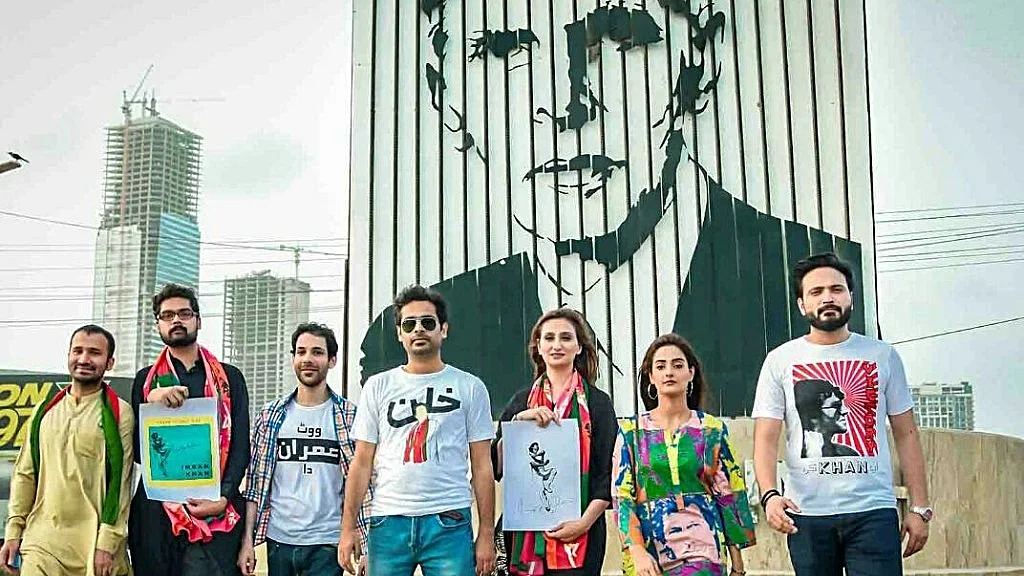Nation at a crossroads: Pakistanis vote in extremely divisive election
Voters in Pakistan head to the polls amid a deepening political polarisation and accusations that the military is backing a party. But the vote could further destabilise the country

Will cricketer-turned politician Imran Khan (pictured above) be the next prime minister of Pakistan? Will former Prime Minister Nawaz Sharif's efforts to "rein in" the military generals and his "courageous" return to Pakistan from the UK to face prison help his Pakistan Muslim League (PML-N) party in Wednesday's vote? Is the country's powerful military really meddling in elections? Here, in the capital Islamabad, most people are debating these questions. Pakistan's worsening economy, the country's acute water and energy crises, foreign and security policies, ties with India and Afghanistan hardly come under discussion.
It sounds clichéd that Pakistan is at a crossroads, but on election eve, the mood in the country is somber. Analysts and everyday people are unanimous that these general elections could make or break Pakistan.
As voters go to the polls on Wednesday, it is difficult to predict the results. If Sharif's party, which is now run by his younger brother and former chief minister of the country's most populous and electorally most significant province Punjab, Shahbaz Sharif, secures a majority, Pakistan could face a bigger civilian-military clash in the coming months.
If Khan's Pakistan Tehreek-e-Insaf (PTI, Movement for Justice) party manages to win most seats in the National Assembly (lower house of parliament) and provincial assemblies, Sharif's supporters would likely protest against the military and allegedly military-backed Khan even more vehemently. Khan's possible conservative and populist premiership could see an even further surge in anti-West sentiment. Ties with the United States, which has been forcing Pakistan to take decisive action against militant Islamists along the Afghanistan-Pakistan border, could deteriorate with a possibility of more economic sanctions.
Thus, the Wednesday vote has been dubbed "Pakistan's most crucial election" in at least two decades.
It sounds clichéd that Pakistan is at a crossroads, but on election eve, the mood in the country is somber. Analysts and everyday people are unanimous that these general elections could make or break Pakistan
Is Imran Khan's victory imminent?
"Opinion polls put Khan's PTI ahead in the elections. It will gain most seats in parliament, but it is possible that Khan will need the support of independent members to form the government," Jan Achakzai, a political analyst who quit the PML-N party earlier this year, told DW.
Achakzai is not the only ex-PML-N official who has left the party; many former Sharif aides have deserted him since the three-time prime minister confronted the military over the issue of civilian supremacy.
"The PML-N is not in a position to win the election. They will even lose in their stronghold, Punjab. Those candidates who can win elections on their own (called "electables" in Pakistan), have sensed PML-N's defeat and are now supporting Khan," added Achakzai.
Achakzai said the 20 million newly registered voters, mostly young people, will determine the outcome of the election.
"The voters' turnout will be impressive on Wednesday," he said.
Reconciliation or accountability?
But many analysts say that Sharif, who is currently in jail on corruption charges, is likely to remain a significant force in Pakistani politics even if his party fails to win the election.
Sattar Khan, DW's correspondent in Islamabad, said that Sharif enjoys considerable support, especially in Punjab province.
"Under the leadership of Sharif and his brother Shabaz, Punjab has progressed immensely. The province is more prosperous now and its development projects have been massive. The PML-N government has opened many new hospitals, constructed new roads and completed mass transit projects in the past few years," Sattar Khan said, adding that Sharif's supporters don't care about corruption allegations against their leader and have remained loyal to him.
But Sattar Khan said the election is definitely the "most divisive" in Pakistan's recent history.
At the same time, Imran Khan's potential victory could initiate a new conflict and its potential government would likely face difficulties in running the administration. Khan says he will not reconcile with either Sharif or former president and Benazir Bhutto's widower Asif Ali Zardari, as, according to him, both are corrupt and have misruled the country.
Some people in Islamabad are of the view that Pakistan needs political reconciliation more than ever; a new "social contract" among politicians, judiciary and the army to take the country out of a number of existential crises. But Amjad Shoaib, a defense analyst and retired lieutenant general of the Pakistani army, says Pakistan needs "accountability." "The economic situation of the country is dire. Nawaz Sharif and his party have ruined the economy during their tenure. So Pakistan needs to weed out corruption. We don't need reconciliation with those who have harmed Pakistan," Shoaib told DW.
'Military is not responsible for political chaos'
Shoaib is vexed with Western media over its "acceptance" of the "military's election interference" narrative.
"Sharif was convicted in corruption cases and was sentenced to jail by courts. He is blaming the military only to conceal his crimes," the retired army official said.
"The military is not meddling in election. Western media needs to understand the nature of cases against Sharif. Corruption and corrupt politicians face the music in ever country. Why accuse the military for your corruption," Shoaib questioned.
Security has been beefed up in Islamabad and other parts of the country ahead of the polls. Violent attacks in the run up to the elections have killed a number of candidates and the authorities fear more assaults during the polling. An "Islamic State"-claimed terror attack in Mastung, Baluchistan, earlier this month, turned out to be one of the biggest militant assaults in Pakistan's history.
Military supporters say the "political bickering" around these elections could compromise Pakistan's security.
Follow us on: Facebook, Twitter, Google News, Instagram
Join our official telegram channel (@nationalherald) and stay updated with the latest headlines